Preserving history for a big celebration
Teri Saylor
Special to Publishers' Auxiliary
May 1, 2024
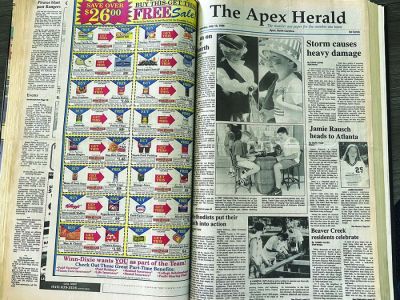
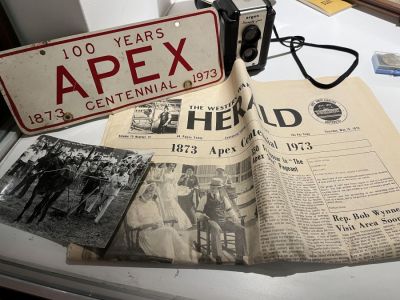
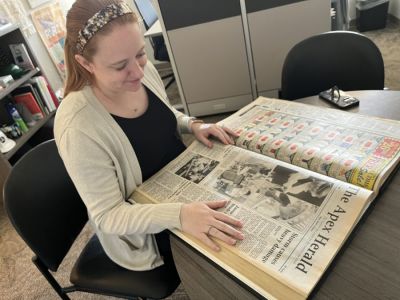
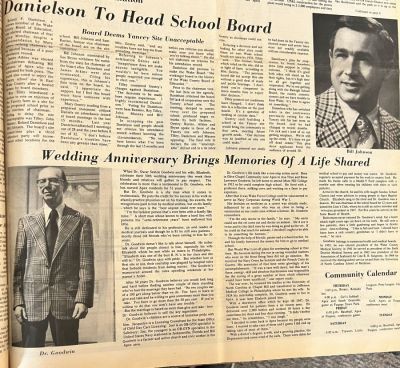
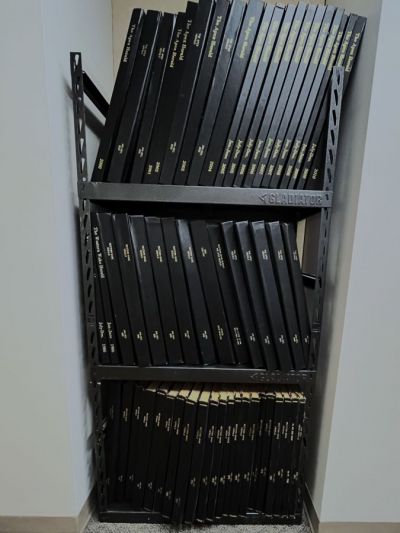
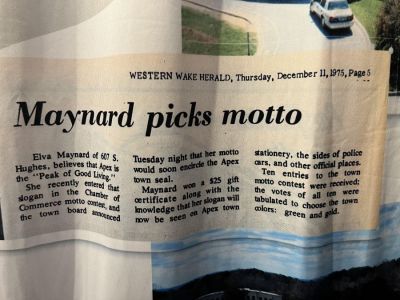
When the town of Apex in North Carolina celebrated its 150th anniversary, the bound volumes of the former weekly newspaper filled in the gaps
Assigned the monumental task of planning her town’s sesquicentennial celebration, Kerrin Cox spent hours scouring the heavy black binders full of newspapers chronicling years of small-town life in Apex, North Carolina.
Cox, communications coordinator for the town of Apex, was in charge of the year-long observance, which included history exhibits, historic site tours, timelines, oral histories, a specially commissioned book and a play, and to top it off, a grand street festival on the main drag in town.
She worked with her staff and a team of 170 volunteers to make the anniversary the party of the century, and she believes she would not have been able to do it justice without help from a set of bound volumes of The Apex Herald, a weekly newspaper that circulated for 55 years in the southwestern corner of Wake County, about 15 miles from Raleigh.
The Apex Herald was not the oldest newspaper in the state by a long shot, but it was just what she needed to capture day-to-day activities that might have seemed hum drum at the time, but a gold mine of recent history in the rearview mirror.
“One day I was just flipping through one of the Heralds looking for something that I don’t even remember now,” she said. “We were planning to feature 11 storytellers to tell stories about life in Apex at our big street festival.”
One of those stories was about Dr. Oscar Sexton Goodwin, a beloved physician and family patriarch who had died 50 years before. Cox struggled with script until she found an article commemorating his and his wife’s 50th wedding anniversary in the dusty old pages of The Apex Herald.
“I had interviewed his grandchildren, and they had given me lots of great information about him, but I needed more,” she said. “As I was flipping through the newspapers, I saw a front page article that gave his biography, and from that story, I wrote the script about him and his impact on our community.”
A LOT TO CELEBRATE
Incorporated in 1873, Apex was a small farm-to-market community in its early years with a population of 349. The town was named Apex because it sat at a high point along a 30-mile section of what is now CSX railroad.
In its early days, Apex was home to a bustling tobacco market. But two fires in 1905 and 1911 destroyed downtown, and 20 years later, the Great Depression hit Apex hard. The tobacco market declined, and by 1934, Apex had fallen on hard times.
Over the next 90 years, the town fought back, and today, it’s making national headlines for its explosive growth and star power, ranking on many lists of superlatives as among the top places in America to live. With its current population of 76,775, Apex barely resembles the once sleepy farming community it was a century-and-a-half ago.
At the grand old age of 150, Apex was a town with a lot to celebrate, Cox said.
To create an unforgettable year-long celebration, she relied on brothers Toby Holleman and Warren Holleman, Apex natives who had been anointed as the town’s unofficial historians. Toby wrote his first book about Apex’s history for the town’s centennial in 1973 and collaborated with Warren on an updated version in 2023. Warren also wrote a play to honor the town’s storied past.
But Cox and her team still had a chasm to fill, which seemed as wide as the Grand Canyon.
“The Hollemans’ book and play covered a ton of history before the town’s incorporation up to the 1940s and ‘50s,” Cox said. “But they didn’t have much on our modern history, and we needed some recent stories.”
That’s when she turned to The Apex Herald morgues, filled with community news from around 1958 until 2013. Cox doesn’t know how the bound volumes ended up in the Town Hall after the newspaper closed its doors, but she was glad to have them.
Through her work, Cox realized that newspapers really are the first rough draft of history. She had never thought much about that until the sesquicentennial.
Today, she realizes how fleeting life’s little moments and big events are when there is nobody there to document them.
“The lived history of our town is disappearing as people pass away,” she said. “But their stories are permanently documented here in the pages of these newspapers, and it’s really cool to be able to look back, get into the moment and read about these events as they unfolded in real time.”
Cox recalls her own excitement when she looked back at a news article reporting on Clarice Atwater, elected in 1981 as the first Black woman on the town commission, who went on to serve as mayor pro tempore. She notes the importance of having stories like this to look back on.
“Ms. Atwater passed away in 2018, and we couldn’t interview her to get her perspective on her election, but she was quoted in the newspaper about what that moment was like for her, and I thought that was really cool,” Cox said.
NEWS DESERT
There are 10 municipalities in Wake County. In the 1990s, all of them were home to thriving weekly newspapers. The dominant daily was and still is The News & Observer in Raleigh.
The final issue of The Apex Herald, Vol. 55, No. 32, was published on August 8, 2013. At the time, it was owned by Civitas Media.
According to an article published in the Triangle Business Journal in 1997, the Apex Herald had been part of Ottaway Newspapers and was sold to Bill and Ann Kirkland of Durham, North Carolina, along with a handful of other local weeklies. Over the years, the nameplate toggled between The Apex Herald and Western Wake Herald.
It changed hands a few times and survived stiff competition, including from members of its own staff, who broke loose to start competing weeklies.
The News & Observer was constantly challenging the local newspapers for advertising dollars, along with the Southside Shopper, a TMC which was circulated free to 40,000 residents in southern Wake County. But the scrappy weeklies had loyal supporters who valued local news.
The last two decades have brought many changes to Wake County and its surroundings.
Most of the smalltown weeklies are gone now. And the towns themselves are not small anymore, thanks to the influx of major corporations in the life sciences, technology and advanced manufacturing sectors that are locating here and creating thousands of jobs and an economic boom in North Carolina.
With no community press in town, Cox, a North Carolina native who grew up outside of Wake County, is nostalgic for a time she knows only through newspapers from the past.
“We have a little bit of a news desert here with no local newspaper and the lack of reporters focusing on stories about our town,” she said.
She recalled a story published in The Apex Herald in 1975 announcing the winner of a Chamber of Commerce contest to choose a new slogan for the town.
There were 10 entries, and Elva Maynard’s winning submission called “The Peak of Good Living,” played on Apex’s position at a high point along the railroad tracks. She won $25 and had her slogan plastered all over town. To this day, it is still the town’s slogan.
“That was a big story in its day, and I am not sure it would be covered in the daily newspaper now,” she says. “I can understand how important stories like that are in a town like this, and it’s something we miss.”
The News & Observer still covers Apex occasionally, but overall, it has been years since the town has had a dedicated reporter. An outside publisher has started a local magazine and often calls upon Cox and her staff to provide articles for it. As a communication professional for the town, she sees the magazine as a way to get information into the residents’ hands.
“It has been a great partnership because we’ve been able to put out some long–format articles about the town that are not press releases or social media posts or utility bill stuffers, which cost thousands of dollars to insert,” she said.
When The Apex Herald closed, it did not go out with fanfare; rather, it offered a simple goodbye.
The lede story on the newspaper’s last day — April 8, 2013 — was about a local dentist who saved two women from drowning. At the bottom right corner on the front page was a short column with the headline, “Goodbye and Thank You.”
And with that, the last community newspaper in Apex was done.
Teri Saylor is a writer in Raleigh, N.C. Contact her at terisaylor@hotmail.com






